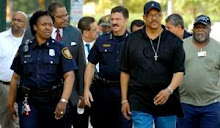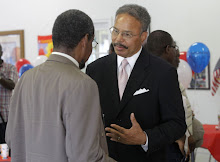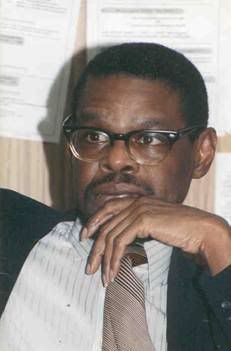NOW SHOWING: AT Eddie Griffin (BASG): GANGLAND
Without commercial interruption or commentary, I proudly present the masterpiece of the truth behind “American Gangster”, done by none other than Frank Lucas and Nicky Barnes themselves in collaboration.
The documentary opens with the statement: They (Frank Lucas and Nicky Barnes) killed in the name of commerce… They shot a man at point-blank range and the man’s short caught afire.
It reminded of Fort Worth outlaw Luke Short, owner of the White Elephant saloon, friend of another top-hat wearing outlaw named Bat Masterson. They both wore top hats and carried .45 caliper derringers up their sleeves. It was with one of these concealed handguns that Short shot a man and his shirt caught fire.
In 1883 Short settled in Dodge City, Kansas, where he purchased a half interest in the now famous Long Branch Saloon. This put him at odds with the mayor of Dodge and his allies, who made attempts to run him out of town as an "undesirable". In what became known as the Dodge City War, Luke's friends rallied a formidable force of gunfighters to support him, including Bat Masterson, Wyatt Earp, Doc Holliday, and Charlie Bassett. Faced with the threat of force, Short's opponents allowed him to return without a shot being fired. Later that year he sold his interest and moved to Fort Worth, Texas.
In Fort Worth, Short was involved in another of the most famous historical gunfights. Short had developed an invested interest in the White Elephant Saloon. "Longhair" Jim Courtright, who was then Marshal of Fort Worth, reportedly had a protection rackett, in which he offered his "protection" to saloon and gambling house owners. Short turned him down, telling him he could protect his own place. This irritated Courtright, and many now believe that Courtright felt it was necessary for his other protection interests to make an example of Short as to what could happen if his services were declined.
On a cold February 8th night, in 1887, Courtright called Short out of the White Elephant saloon. Courtright reportedly had been drinking, some words were passed, and the two men walked down the street about one block. There, facing one another, Courtright said something in reference to Short's gun, apparently to give the impression that the inevitable gunfight was in the line of duty. Short stated he was not armed, although he was. Short then indicated that Courtright could check for himself, and walking toward Courtright, he opened his vest. When he did so, Courtright said loudly "Don't you pull a gun on me.", and quickly drew his pistol.
However, Courtright's pistol hung on his watch-chain for a brief second, at which time Short pulled his pistol and fired one shot. The bullet tore off Courtright's right thumb, rendering him incapable of firing his single-action revolver. As he tried to switch the pistol to his left hand, Short fired at least four more times, killing him. wiki
This story was told to the Fort Worth newspaper, but later in life Bat Masterson would tell a different story. That the saloon had already been sold to the Ward Drugs boys. As Short walked Courtright around the side of the White Elephant with his arm around his shoulder, in the moonlight under the window of Bat Masterson, Luke shot the marshal at point-blank range with a derringer's bullet to the heart. The evidence was staged as a shootout.
So goes the story of a Fort Worth outlaw named Eddie Griffin, who grew up in a city Where the West Began and where he saw the Old Wild West come to An End.
Thursday, November 29, 2007
Friday, November 9, 2007
All not well in education, former U.S. secretary says
by Nacole Battee, Reporter
Tarrant County College Collegian
FORT WORTH, TEXAS The future will be a testament of today’s education system, a former U.S. secretary of education told more than 500 grade school and college students Oct. 30 on South Campus.
Dr. Rod Paige, the seventh education secretary, served during President George W. Bush’s first term.
“All is not well with the public education system,” he said. The political bickering and status quo politics have overshadowed the public’s real concerns, Paige said. Too many have been protecting the system, and now society needs to protect the children.
Paige said the public education system is not a structure but rather a concept of ideas that need to be narrowed. He said being crystal clear on standards, obtaining an accountability system, having visibility to see the system and giving students the choice of which schools to attend will help the education system.
Having the lowest high school graduation rates and knowing that 2/3 of young people do not achieve academic standards is a civil rights issue, Paige said. “Will society survive when the achievement gap has only closed 5 points in the last 15 years and at this rate will take over 55 years to close?” he asked.
The public education system will be successful when they become free to do what they want to do, Paige said. However, he said, testing is necessary to measure the success of the educational system.
“It is time now for talking about a lost generation,” he said. “If they are lost, it is we the adults who have lost them.”
Paige said the public education system should be here to serve the children. A question-and-answer session with the elementary students followed the speech. “There is nothing wrong with your DNA,” he told the group. Paige used Terrell Owens from the Cowboys to illustrate that even when trying their best, people sometimes drop the ball. Never giving up is the key to being successful, he said. To concerned parents, Paige said a change in the public education system should be able to produce quality students who will be on a global competitive level. He said in order to change the system, people should be more aware of who is on their school boards. The officials, he said, should have the students’ best interest at the forefront and be held accountable.
South Campus was one stop on Paige’s Texas Hope Tour (Help Our People Excel), sponsored by the Ministers for the Education of America. The tour spotlights issues discussed in his book, The War Against Hope: How Teachers’ Unions Hurt Children, Hinder Teachers, and Endanger Public Education.
In his book, Paige says the greatest obstacle to public school reform is “the enormous, self-aggrandizing power wielded by the teachers’ unions.” The book is an analysis of America ’s crisis in the classroom. It traces the history of the National Education Association from its beginnings as an advocate of educational excellence to what he says is “the early radicalization by left wing ideology.”
The South Campus African American Male Enrichment Network hosted the event.
Tarrant County College Collegian
FORT WORTH, TEXAS The future will be a testament of today’s education system, a former U.S. secretary of education told more than 500 grade school and college students Oct. 30 on South Campus.
Dr. Rod Paige, the seventh education secretary, served during President George W. Bush’s first term.
“All is not well with the public education system,” he said. The political bickering and status quo politics have overshadowed the public’s real concerns, Paige said. Too many have been protecting the system, and now society needs to protect the children.
Paige said the public education system is not a structure but rather a concept of ideas that need to be narrowed. He said being crystal clear on standards, obtaining an accountability system, having visibility to see the system and giving students the choice of which schools to attend will help the education system.
Having the lowest high school graduation rates and knowing that 2/3 of young people do not achieve academic standards is a civil rights issue, Paige said. “Will society survive when the achievement gap has only closed 5 points in the last 15 years and at this rate will take over 55 years to close?” he asked.
The public education system will be successful when they become free to do what they want to do, Paige said. However, he said, testing is necessary to measure the success of the educational system.
“It is time now for talking about a lost generation,” he said. “If they are lost, it is we the adults who have lost them.”
Paige said the public education system should be here to serve the children. A question-and-answer session with the elementary students followed the speech. “There is nothing wrong with your DNA,” he told the group. Paige used Terrell Owens from the Cowboys to illustrate that even when trying their best, people sometimes drop the ball. Never giving up is the key to being successful, he said. To concerned parents, Paige said a change in the public education system should be able to produce quality students who will be on a global competitive level. He said in order to change the system, people should be more aware of who is on their school boards. The officials, he said, should have the students’ best interest at the forefront and be held accountable.
South Campus was one stop on Paige’s Texas Hope Tour (Help Our People Excel), sponsored by the Ministers for the Education of America. The tour spotlights issues discussed in his book, The War Against Hope: How Teachers’ Unions Hurt Children, Hinder Teachers, and Endanger Public Education.
In his book, Paige says the greatest obstacle to public school reform is “the enormous, self-aggrandizing power wielded by the teachers’ unions.” The book is an analysis of America ’s crisis in the classroom. It traces the history of the National Education Association from its beginnings as an advocate of educational excellence to what he says is “the early radicalization by left wing ideology.”
The South Campus African American Male Enrichment Network hosted the event.
Subscribe to:
Posts (Atom)


